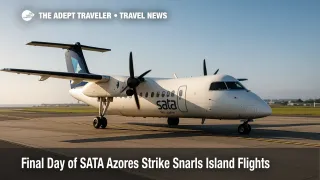Final Day of SATA Azores Strike Snarls Island Flights

Portugal's SATA Air Açores cabin-crew stoppage, now in its seventh and final day, continues to squeeze inter-island air links across the Azores while nudging delays onto mainland connections through Lisbon and Porto. Minimum-service rules keep at least one round-trip per island, yet dozens of non-essential rotations remain scrubbed, leaving would-be island-hoppers rebooking or rerouting by ferry. With 4 500 daily passengers normally funnelling through the archipelago's nine airports in high season, the carrier warns of lingering backlogs just as a separate ground-handling strike looms tomorrow.
Key Points
- Why it matters: Cuts up to 70 percent of SATA's scheduled island hops today.
- Only one round-trip per island guaranteed under court-mandated minimum services.
- ≈35 000 passengers potentially affected over the seven-day stoppage.
- Knock-on delays reported on Lisbon (LIS) and Porto (OPO) feeder flights.
- SPdH/Menzies ground-worker strike starts 25 July, threatening wider disruption.
Snapshot
Operations remain trimmed to skeleton service lists published by SATA-linked scheduler Radio Lumena, showing six flights for São Jorge today versus the usual 20. Similar patterns apply across Pico, Faial, Flores, and Corvo, where travellers rely almost exclusively on Dash 8 turboprops to connect with medical appointments, business trips, or onward Europe-bound legs. Flights that do operate are running near 100 percent load, with priority boarding for residents on time-critical journeys. Mainland-bound Azores Airlines services are technically unaffected, yet crew positioning issues have forced rolling delays-averaging 45 minutes-on Ponta Delgada-Lisbon shuttles. Airports report baggage queues stretching 30-40 minutes as mixed crews juggle reduced staffing.
Background
The National Union of Civil Aviation Flight Personnel (SNPVAC) called the 18-24 July stoppage to press for wage alignment with Azores Airlines colleagues and relief from chronic heat issues on older Dash 8-Q200 cabins. An arbitral tribunal imposed minimum services to safeguard public mobility, citing 4 500 booked daily passengers and the lack of viable inter-island alternatives. SATA allowed free rebooking or refunds and warned it could not guarantee hotel rooms given peak-season occupancy. The carrier also leased an ACMI wet-lease aircraft to maintain critical cargo and medevac capability. Although media reports last week hinted at a tentative pay deal, union officials confirmed to local press that negotiations "remain suspended" pending a full remuneration roadmap, hence the strike running its full course.
Latest Developments
Skeleton schedule holds but queues grow
Radio Lumena's daily list shows 14 inter-island sectors instead of the usual 46, concentrating on morning and early-afternoon banks. Travellers report gate changes announced within 30 minutes of departure, and carry-on allocations are being strictly enforced to speed turn-arounds.
Mainland ripple effects intensify
Ponta Delgada-originating flights to Lisbon and Porto left up to 90 minutes late during Wednesday's evening wave as inbound crews exceeded duty limits. Azores Airlines is waiving change fees for mainland legs mis-connected by strike-hit feeders and advising a four-hour buffer in Lisbon for onward European or U.S. connections.
New ground-handling walkouts start 25 July
Separate unions for SPdH/Menzies ground staff begin a 72-hour national strike at 00:00 Friday, followed by four weekend walkouts in August. That action affects check-in, baggage, and ramp work at every Portuguese airport-including Ponta Delgada, Horta, and mainland hubs-raising the prospect of compounded disruption just as SATA resumes its full roster.
Analysis
SATA's week-long stoppage underscores a persistent labour fault-line in Portugal's fragmented aviation ecosystem. While the Azores archipelago depends on reliable lift for everything from medical evacuations to perishable freight, regional crew pay scales lag those of mainland peers despite identical EU-mandated safety responsibilities. The tribunal's minimum-service order-arguably one of the most stringent in Europe-did shield essential mobility, yet also blunted the union's leverage, prompting anger among rank-and-file members who see their action diluted. Conversely, SATA's financial fragility limits management's capacity to grant sizeable raises without external subsidy or fare surcharges.
For travellers, the episode reinforces two practical lessons. First, inter-island itineraries demand margin: a half-day spare between Azores hops and long-haul departures is prudent, particularly in peak-season strike windows. Second, ground-handling walkouts-often overlooked-can ripple further than crew stoppages, strangling baggage flows and aircraft turnaround times even when the flight is technically "operating." Tomorrow's SPdH/Menzies strike could therefore prove more disruptive to Lisbon-bound connections than the cabin-crew dispute it follows.
Long-term, the Azorean government's dual imperative-maintain affordable connectivity while nudging SATA toward break-even ahead of partial privatisation-suggests labour turbulence may persist. If July's twin strikes converge into August's planned weekend walkouts, Portugal's aviation network could experience rolling capacity squeezes akin to the 2022 TAP maintenance dispute, chipping away at hard-won tourist confidence. Monitoring arbitration outcomes and union ballots will be vital for anyone planning multi-segment Portuguese itineraries through late summer.
Final Thoughts
With the SATA Air Açores stoppage due to lapse at 23:59 local time tonight, most islands should see normal schedules by Saturday-weather permitting-but residual queues and displaced crews may linger 24-48 hours. Travellers connecting via Lisbon or Porto on 25-28 July face a fresh layer of risk from ground-handling strikes. Reconfirm flights, allow generous buffers, and keep essentials in carry-on bags until both labour actions clear. Staying flexible remains the best defence against Portugal's July strike season.
